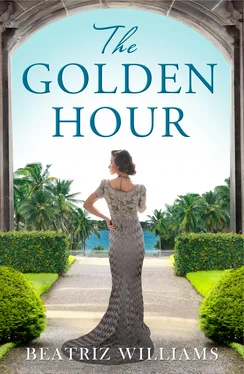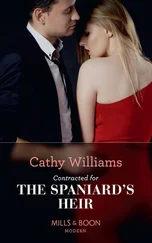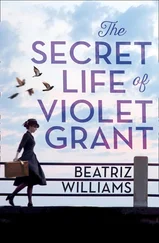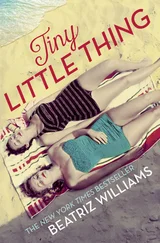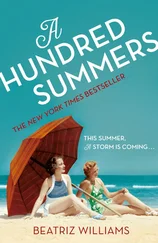Wilfred laughs. “America’s not as exotic as you think. Maybe the western part.”
“Have you been there?”
“I went to Boston with my father, one summer. It was hot and dirty and businesslike, and the people were surprisingly prim. They draw from Puritan stock, I believe. Then we went to Cape Cod for a couple of weeks, which was rather nicer. It sticks out right into the ocean, you see, curling like a scorpion’s tail, and we swam in the surf every morning at sunrise.”
“Heaven,” says Elfriede.
Wilfred struggles upward to sit beside her. “Not quite.”
“Why not?”
“ This is more like heaven, if you ask me.”
A breeze comes upon them, stirring Elfriede’s clothes. Stirring his. The sky is clear above the greens and grays of the mountaintops, except for a single, small cloud that sticks to the highest peak. The air smells of warmth, of sunbaked grass, and occasionally of Wilfred when his scent steals close enough.
“I don’t understand …” she begins softly.
“Understand what?”
“Why you should move me like this, when he loved me so much. So terribly.”
“It’s strange, isn’t it? This.”
She leans her head on his shoulder. “What are we to do?”
“Nothing.” He touches her hair. Then he says it again, in English. Nothing.
Nothing , she repeats.
“No-thing. Th-th-th. Put your tongue beneath your upper teeth.”
“No-thing,” Elfriede says again, paying particular attention to this English th , her Waterloo these past few weeks. In order to pass the anxious time while Wilfred lay in bed with his relapse—a friendly orderly passed the notes between them—she began to teach herself English with the books from the sanatorium’s extensive library. She hoped to astound him when he recovered. Good morning , she said to him, when they met at last on the wall of the infirmary garden, the exact spot where they had spoken their first words to each other. (This by design, of course, in a note passed that morning from the orderly’s pocket.) I hope you are vell . She remembers how he turned—she’d come up to him from the meadow behind—and how the sight of his face, pale but radiant, made her dizzy. How his smile, growing slowly across his face to expose his teeth, illuminated the universe. Well , he said. W-w-w. Well.
W-w-well , she repeated.
I am well, thank you. Are you well, my love?
I am wery vell.
Now it’s a joke between them, how wery vell they both are during these slow, beautiful hours together. How wery vell the sun shines upon them, how wery vell the air smells, the ground feels, the skin glows. How wery vell she’s progressing in her English lessons.
Nothing , Elfriede says again. Nothing. Nothing. Nothing. We are doing nothing. How is zat?
“I’m being discharged,” Wilfred says in German.
BUT ISN’T THIS WHY THEY’VE fallen in love, so suddenly and so utterly? Because of course Wilfred must go home when he’s better, because of course Elfriede and Wilfred must part. It’s so easy and so safe to fall in love when the universe is against you. Now, they haven’t quite said those words to each other— I love you, we’ve fallen in love —but Elfriede has no doubt they echo inside Wilfred’s head, in the same way they echo in hers.
I am wery vell , she said aloud, on the wall of the infirmary garden. Translation: I love you.
Come, let’s go for a walk , Wilfred replied, taking her hand. Translation: I can’t bear to exist without you.
And they walked, and they existed with each other, and in the touch of Wilfred’s hand Elfriede imagined the rest of him. When they sat to rest, Elfriede stared at their clasped palms in the grass, Wilfred’s large, white bones curled around hers, and a premonition of grief came upon her. But what will I do when you’ve gone? she whispered.
I have an idea , Wilfred said. Let’s not speak of that day until it comes .
NOW IT’S COME.
“ What? ” Elfriede says.
“After all, I’ve regained my health.”
“But they don’t ever make you leave, the doctors. You can stay as long as you like.”
“Only if you’ve got the dosh, my dear.”
“But I could—we could—I have plenty of money—”
“You mean your husband has plenty of money.”
Elfriede bows her head to this truth. Across the meadow, about thirty yards away, the grass stirs. A rodent of some kind, or a rabbit. Making preparation for winter, though the sun is still warm, no hint of evil yet cools the air.
“We have until Thursday,” Wilfred says. “Four more days.”
“And then what?”
“Nothing. I go about my life, pretending my heart’s not beating away somewhere else, beating inside your chest—”
“Oh, don’t. Don’t.”
He doesn’t. So they sit, as they always do, as they’ve done for the past few weeks, since Wilfred was first allowed out of the infirmary garden with strict instructions not to exert himself, not to expose his lungs to any hint of inclement weather. Lucky for them, the weather has been fine, an unprecedented succession of warm, dry, perfect days. Or maybe it’s not luck, after all. Maybe some more conscious force has arranged their affairs in this manner. Either way, the result’s the same. They sit side by side in the meadow grass, watching the sun make its eternal arc across the heavens. Sometimes he touches her, as he does now. His fingertips on the backs of her knuckles.
“I once met this fellow in the south of France, this painter. Do you know what he called this time of day? The hour before sunset?”
“No.”
“The golden hour.” Wilfred waves his hand at the sun, which now burns just above the jagged peaks that form their horizon. “He said that’s when everything looks the most beautiful, just before the sun sets. This luminous air turning everything to gold. He said it made him want to paint the whole world. And then it’s gone, just like that. The sun disappears. The night arrives.”
“The golden hour.” Elfriede stares at Wilfred’s hair, which has indeed transformed into a gold so pure as to make the alchemists weep, like the sun itself. She wants to touch it, to bury her face in it, to lick the gold from each strand before it’s gone. Before Wilfred’s gone, and the night arrives.
“What about you, Elfriede?” he asks. “That’s the important thing. What will you do?”
“I don’t know. Except I can’t stay here any longer if you’re gone.”
“Can’t you?”
“No, it’s impossible. It will hurt too much.”
“Not so much as it hurts me to leave.”
“No, more. Because you’ll have Vienna, you’ll have new sights and scenes, nothing to remind you of me. Whereas here, these buildings, this mountain, this meadow—everything is you now. And it will be empty.”
“Is that so intolerable?”
“You know it is.”
“Hmm.” The fingertips make another waltz on her knuckles. A Blue Danube of longing. “I thought you needed approval from this doctor to leave. Are you certain you want to cross him?”
“He can’t stop me. I’ll find a way out, like you.”
Find a way out. Once she says the words, once she releases them into the air, they become possible. The horror of the outside world loses all consequence compared to the horror of existing inside the sanatorium without Wilfred. Against that, she has no other fear: not the mountain roads or the trains or the stares of strangers, not the husband she has disappointed, not the baby who doesn’t know her, not Herr Doktor Hermann and all his degrees and authority. She can leave. She is the wife of a baron, after all. She can arrange for a carriage, she can simply walk out the door if she wants. Who will dare to stop her?
Читать дальше
